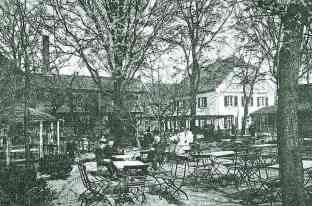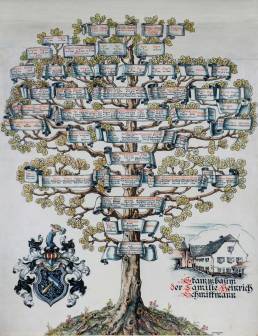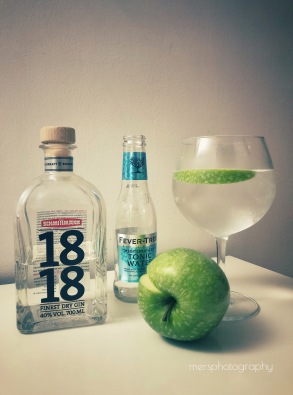I’m always surprised to hear about gins originating from Germany. Maybe because in my mind, I’m only used to associating beer with this country, but as it happens, the gin scene there is quite extensive and I haven’t even begun to scratch the surface of what they have to offer. My sister-in-law, who travels for work, is always kind enough to return with local gins from airport Duty-Free shops. She had to go to Düsseldorf on a regular basis sometime back and spotted a humble bottle on a shelf. What I wasn’t expecting was that she had found one produced in the city of Düsseldorf itself! This gin is called Schmittmann 1818.

Sailors on horses tugging their ships on the banks of river Rhein. Image by Schmittmann GmbH.
Schmittmann is a family-owned distillery that has been in operation since 1818 (two centuries as of last year!). It was originally a small brandy distillery in a courtyard just a stone’s throw away from the river Rhein, led by the widowed Adelheid Schmittmann. Her husband, Michael Schmittmann, was a baker and beer brewer. This gave them lots of knowledge and experience with grains to produce other spirits. Adelheid started off by selling alcohol to the sailors that had to drag their ships with horses on to the banks of the river. With the Industrial Revolution in full steam, the small village transformed into a booming metropolis, and so did their setup. Adelheid’s son, Benedikt, was so influenced by the changes of that era that he even added a brewery to their distillery and founded a brickyard and herb factory. A real visionary at the time, making their company a very versatile business. Benedikt’s son, Wilhelm, was supposed to take over the reins of the 3rd generation, but unfortunately died at a young age. Nevertheless, Wilhelm’s wife, Maria Agnes, and brother-in-law stepped up to the task and pushed the family business into the 20th century.

Picture from 1900 of Schmmitmann’s beer garden and brewery in Niedelkassel. Image by Bilderbuch Düsseldorf.
During the First World War, the distillery came to a complete standstill due to the fact that their copper stills had to be handed over for the manufacturing of weapons. Then in the Second World War, with Düsseldorf being heavily bombed, most of the buildings and factories in the city were completely destroyed, including their distillery. But this did not stop the Schmittmann family from pushing forward and rising from the ashes. Two 4th generation brothers, Hubert and Franz Josef, rebuilt a state-of-the-art distillery that stands to this day. It was passed on to Hubert’s son, Kurt Schmittmann, who studied distillery technology and is now led by his two 6th generation daughters: Sonja and Vera.

The Schmittmann family tree. Image by Lust auf Düsseldorf.
I think what is really amazing about the company history is how it’s been shaped for the last two centuries not only by men but also by very strong, hard-working and determined women. Nothing stopped them from carrying the torch that ensured their legacy lives on.
As for the 1818 Gin, this has been a recent addition to the other spirits they produce in their noble distillery (korn, schnapps, and bitters). The reason why they call it “noble” is because of the noble grains they use to produce their own alcohol, which is highly regarded in the region. The sisters unearthed an old gin recipe that was kept in a safe for over 50 years in order to join the current gin trend in the market, but they wanted to give this spirit an improved and modern touch. Together with their master distiller Thorsten Franke, they worked arduously to come up with a fresh, new blend that they believed would even please the Queen of England. It is said they actually shipped their very first bottle to Her Majesty! The wheat distillate of 96.7% purity obtains its premium quality after being stored in 70 to 80-year-old oak barrels for a year. They then dilute it with water from their in-house well and add their selection of fresh botanicals before moving the blend to traditional clay pots for an additional 4 to 5 weeks for maceration. Their botanicals include juniper berries, citrus peels, ginger, coriander, galangal root, and licorice, among other secret herbs and spices.
Happy with the results, they produced a total of 1,000 litres for their very first batch. Sonja and Vera were meticulous with the marketing strategy of their newborn spirit; stepping away from the conventional bottles and labels used to present their other products. They wanted to pay tribute to the roots of their family heritage and their great-great-great-grandmother Adelheid, hence why they named it Schmittmann 1818.
Needless to say, Schmittmann has quite a rich and interesting family history that makes you want to know more. The next time I visit Düsseldorf, I’ll be sure to sign up for their distillery tour!
You may have noticed that whenever I try a new gin, I always go for the simplest of combinations first by adding some lemon peel. Back in the day, when there were only a handful of gins, the traditional garnish of choice was either a wedge of lime or lemon. One way to up your cocktail garnish game is by using the natural oils pocketed in citrus peel’s pores. Before dropping the peel into your glass, hold it lengthwise with both hands, zest facing your drink, and then squeeze it with your thumbs and forefingers until a delicate mist sprays out. The aroma is absolutely glorious. What I also like to do is rub the peel on the inner rim of the glass for extra flavour.
This mixture worked relatively well, giving the drink a sweet flavour that complemented the citrus notes from the botanicals. The texture was very smooth at first and it became notably bitter straight after, leaving the telltale bitter aftertaste on your palate and down your throat. Overall, I found this a well-balanced cocktail that allowed the gin to flourish whilst tasting.
Schmittmann 1818 Finest Dry Gin + Fever Tree Mediterranean Tonic Water + Granny Smith Apple

A combination fit for a queen.
It took me a number of tries to find another suitable combination before settling on this particular one. When you hit the wall with other citrus fruits such as orange or grapefruit, you need to start moving on to other fruit groups. Most mixes ended up conflicting with either the gin or the tonic and simply didn’t pair well together. Then I suddenly realised (from past experiences with gins like Citadelle and Jinzu) that Granny Smith apple might be the answer here.
The moment I lifted the glass to have my first swig, I could tell this was the mixture I was looking for. The subtle smell of the apple jumped from the glass and dotted my nose with its distinctive scent. Savoring it was the best part. This particular fruit’s characteristic tart, acidic and sweet flavour engulfed my palate and unraveled surprising citrusy tones in the process. “At last,” I thought, “a mixture that went well together!”
While enjoying this drink further I noticed there wasn’t much bitterness to be had apart from the mild undertone literally right at the end as the mix went down my throat. The delicate sweetness I perceived instead most probably came from the Mediterranean Fever Tree tonic water. Sweeter than its golden sister tonic water, it renders a smooth texture that not many other brands in the market can offer. Out of all the combinations I experimented with, this was hands down the best mix for an 1818 gin and tonic.
The Granny Smith combination gets my seal of approval as the best serve. However, in my humble opinion, the Schmittmann 1818 gin does not offer enough to distinguish itself from other gins. Whilst the texture is very smooth and the gin is certainly a pleasure to drink, it still somehow felt a little mainstream. It’s not a gin I wouldn’t recommend, but it won’t be on my top list of gins with a wow-factor.
Find out more about the products mentioned in this post below.

Schmittmann 1818 Finest Dry Gin
Shop Now | Recipe Book
